|
Inmarsat has switched on its most powerful satellite to date, GX5, providing additional capacity to Europe and the Middle East on the Fleet Xpress Ka-band high-speed broadband service designed for the maritime industry.
The spacecraft, launched in November 2019, delivers approximately double the combined capacity of the existing four GX (Global Xpress) satellites, becoming Inmarsat’s 14th operational vehicle in orbit. Related: Tapiit to offer livestreamed onboard training via Inmarsat's Fleet Xpress
Inmarsat plans a further seven satellite launches by 2024, all of which are fully funded. Five will be in geostationary orbit - adding “speed, capacity and resilience” to the existing network - and two in elliptical orbit crossing over the poles, allowing it to begin the world’s only commercial mobile broadband service in the Arctic region.
“We have an ambitious vision for the future and we are progressing the most innovative technology development programme in our history to achieve this,” said Inmarsat ceo Rupert Pearce. “Entry into service of GX5 is the first of several exciting steps ahead for us on that journey.” Related: Inmarsat extends seafarer well-being commitments for Covid-19
Inmarsat say Global Xpress has attracted “tens of thousands” of mobile users across maritime, aviation, business and government sectors in less than five years since its initial launch. GX5 services will be fully backwards-compatible with all GX equipment to date, the company adds.
“We believe that reliable, seamless connectivity is now more vital than ever and will play a crucial role in the accelerated adoption of digital technology as the world emerges from Covid-19,” Pearce concluded.
|


